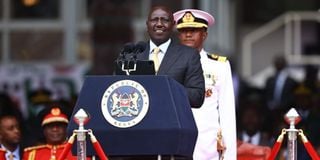Live coverage: Why barring local TV stations was unfair and illegal

President William Ruto at Kasarani International Stadium, Nairobi, on September 13, 2022. The TV images from inside the Kasarani stadium were the same.
What you need to know:
- The inauguration of a president is a public event, which should be open to the media without hindrance.
- The “who” question is the easiest to answer. The order to contract DStv was, in all likelihood, made by the Assumption of the Office of President Committee.
- Punishing all stations for the misadventures of a few is unfair, unnecessary and illegal.
You may not have noticed it as you watched the inauguration of President William Ruto on NTV or any other local television station: The TV images from inside the Kasarani stadium were the same.
They were “feeds” from DStv/KBC, who had exclusive rights to televise the event.
DStv is a satellite Pay TV service owned by MultiChoice, which is based in South Africa.
MultiChoice Kenya Ltd, an affiliate of DStv, was given the exclusive rights to broadcast the event.
KBC, the national broadcaster, has minority shares in the company.
The inauguration of a president is a public event, which should be open to the media without hindrance.
It’s not a World Cup event to be auctioned off for commercial exploitation.
So, who gave DStv exclusive media and marketing rights? And why?
The answers to those questions have a bearing on the constitutional freedom of the media to operate freely.
To answer the “why” question first, let me speculate that the auction took place to help the financially strapped KBC.
This doesn’t exclude other explanations. Another is that the local media don’t have the technical capability to produce video signals that can be streamed across Africa.
The intention was to provide a pop-up channel for the rest of the world.
Another plausible explanation is that barring the local stations was collective punishment for their alleged biased reporting of the election campaign.
Dennis Itumbi, UDA’s political strategy and digital consultant, tweeted on September 10: “Hata Cherera akiita press conference, we are sure no SPLIT SCREEN. We all know when we talk biased media.”
Dissenting IEBC commissioners
The tweet was in reference to the four dissenting IEBC commissioners, led by vice-chairperson Juliana Cherera, who walked away to hold a separate press conference during the announcement of the August 9 presidential election results.
The “who” question is the easiest to answer. The order to contract DStv was, in all likelihood, made by the Assumption of the Office of President Committee.
It included three persons nominated by the President-elect. The committee, by law, had “all powers necessary” to do its job.
Let’s now go back to one of the three possible “why” explanations: Communal punishment.
Only Citizen TV and its Gikuyu-language sister station Inooro TV were openly biased during the campaigns.
Punishing all stations for the misadventures of a few is unfair, unnecessary and illegal.
There are adequate laws to deal with such misadventures.
The Code of Conduct for the Practice of Journalism requires the media to publish unbiased stories.
The Programming Code for Broadcasting Services requires broadcasters to be impartial and balanced in their reporting and to provide “equitable coverage” to political parties and candidates participating in an election--in particular, presidential candidates.
The Communications Authority of Kenya can revoke a licence to broadcast where the licensee breaches the Code.
* * *
A reader took me to task for saying the Supreme Court used a language ordinary people can easily understand instead of legalese (See my article “Why the abridged Supreme Court ruling on election stung like a bee”--Daily Nation, September 9, 2022).
In the judgment, the court used everyday speech phrases such as “a wild goose chase”, “red herring”, “hot air” and “sensationally claimed” to describe the claims by the petitioners in the Raila v Ruto case.
The reader said such language was “unjudicial”. But judges routinely use such language.
Here are a few examples culled from the Kenya Law Reports:
“Instead of making any such offer, the appellant now takes the court upon a wild goose chase, alleging that he was not in possession of the radio and that the investigating officer must have told the complainant that it was the appellant who stole the radio” (Judge Leonard Njagi in Joseph Kenyethe Muiruri v Republic).
“I am of the view that the defence filed a hallow sham in the nature of a red herring. Besides words and words, it discloses no bona fide triable issues” (Justice Aaron Ringera in Fulchand Manek & another v Bullion Bank Limited).
“At the initial stage he claimed to have engaged an advocate--however, no advocate ever appeared thereafter and the claims were simply hot air” (Justice Hellen Omondi in James Ndege Nyangicha v Republic).
The Public Editor is an independent news ombudsman who handles readers’ complaints on editorial matters including accuracy and journalistic standards.
Email: [email protected]. Call or text 0721989264





